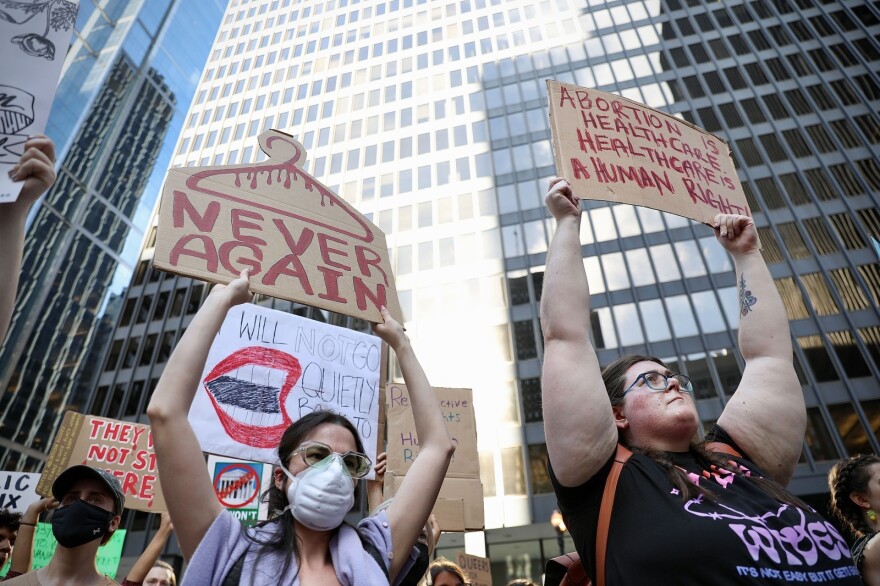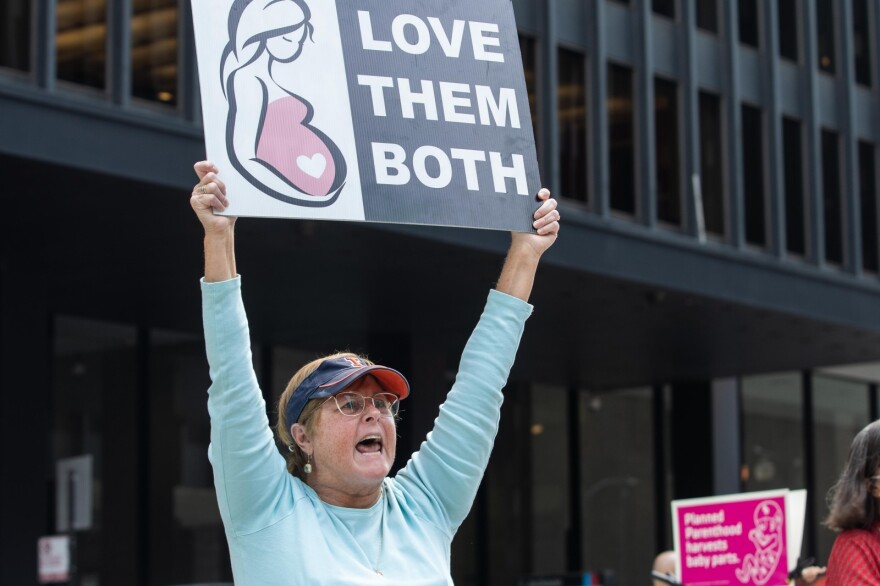Reproductive rights advocates look to Illinois as a Midwestern safe haven for abortion access, while opponents of abortion say the state has gone to extreme lengths to make it the “abortion capital” of the country.
Since the U.S. Supreme Court overturned Roe v. Wade last year, the abortion battle in Illinois rages on — despite the state previously enacting some of the strongest abortion protections in the country. Since June 2022, Democratic state lawmakers have passed a slew of bills ramping up protections for out-of-state patients and expanding overall access. But a small coalition of GOP legislators has been working to undo many of the abortion-rights bills introduced by their colleagues across the aisle — without much luck.
“We’re fortunate that people have elected legislators who, rather than trying to roll back the rights that we have, and to send us backwards, are showing up and passing laws that will protect care in this state,” said Ameri Klafeta, director of Women’s and Reproductive Rights Project at the American Civil Liberties Union of Illinois (ACLU).
In response, several anti-abortion-rights groups have staged multiple demonstrations against these measures, including a March for Life rally earlier this year that drew thousands of people outside the Illinois State Capitol.
Eric Scheidler, executive director of the Illinois-based Pro-Life Action League, said the abortion-rights policies Democratic lawmakers have been passing doesn’t actually represent how most residents feel on the topic.
“I’m not talking about the 20% who are extremely pro-life and the 20% who are extremely pro-choice. People in the middle tend to be pretty moderate on the issue, but not very passionate,” Scheidler said.
And the fight has seeped into the courtrooms. The Thomas More Society, a conservative legal advocacy group based in Chicago, filed a federal lawsuit against the city of Carbondale over its “bubble zone” ordinance that prohibits protestors from coming within 100-feet of an abortion clinic. The ACLU has also said it would take legal action against the city of Danville for enacting an ordinance that would impose fines on anyone shipping or receiving abortion pills or supplies in the mail.
Here’s a look at various abortion-related legislation and proposals since the fall of Roe v. Wade.
Abortion protections
The Illinois General Assembly in 2019 passed the Reproductive Health Act to give residents a fundamental, state right to abortion care. That protected abortion access even after Roe v. Wade was overturned.

But House Democrats felt more was needed, and last year convened a working group dedicated to passing reproductive rights legislation. Kelly Cassidy, D-Chicago, chaired the group and said members spent the next six months researching what bans and restrictions other states were enacting.
“A lot of what actions we need to take will be determined by the actions taken by these hostile states,” Cassidy said. “Constantly watching for the other shoe and being prepared to figure out how we have to react to it.”
These reproductive rights measures have passed in Springfield:
- Protections for Illinois health care providers and out-of-state patients seeking abortion or gender-affirming health care such as shielding providers’ licenses from disciplinary action if they provide lawful health care in Illinois, even if that care is not legal in another state. Patients are also protected from litigation under other state laws.
- Patients can now sue crisis pregnancy centers — which are often Christian, nonprofit women’s health centers that don’t offer abortion care — for committing fraud or using deceptive practices to mislead or discourage patients from seeking abortion care.
- Every public college, community college and university campus must offer emergency contraception in at least one wellness kiosk on campus.
- Law enforcement cannot share automated license plate reader data to any state for the purpose of investigating a person who is coming to Illinois to receive reproductive health care services.
- Insurance companies must cover medication used to induce abortions, hormonal therapy medication and medication used to treat HIV such as PrEP and PEP.
But not all bills aimed at expanding abortion and reproductive access were successful. Lawmakers tried to allow licensed, certified professional midwives to perform abortions. Other failed measures included:
- Providing family leave insurance benefits for eligible employees, which would include leave for abortion care.
- Creating an income tax credit of $500 for a healthcare provider or patient who permanently relocates to Illinois from a state with abortion restrictions to provide or receive abortion care, respectively.
- Requiring the state department of public health to establish women’s health care clinics throughout the state offering affordable healthcare, including contraception and family planning exams.
- Requiring the state’s public health insurance program to include comprehensive family planning and contraceptives services to noncitizens.
Cassidy said the working group has two more items on the agenda: one is to codify abortion access in the state constitution, which she says will ensure that abortion access will stay even if there is a change in leadership.
Another issue is protecting the privacy of people seeking reproductive care.
“In 2023, we have myriad ways that people leave a digital footprint,” ACLU’s Klafeta said. “We’re trying to think about all of those ways that data can be collected and used that could harm people who are exercising their rights in this state for lawful health care.”
Klafeta said abortion advocates should not let their guard down as the state continues to welcome an influx of patients from Midwestern and Southern states that have banned the care.
“Every time we pass protective legislation … almost immediately we see bills introduced to try to overturn those protections,” Klafeta said.
Abortion restrictions
Illinois Republican state representatives and senators have filed dozens of anti-abortion-rights bills, many of them duplicates of each other, over multiple legislative sessions.

Bill Hauter, R-Morton, said the lawmakers who file them know they aren’t going anywhere.
“Those are just bills that you put up to show your base that you’re trying,” Hauter said.
Here is a sample of some of the measures filed by anti-abortion-rights Republican lawmakers — none has made it out of the chambers:
- Requiring any clinic that performs abortions to offer patients seeking abortions after 8 weeks gestation an opportunity to view an ultrasound.
- Repealing the Reproductive Health Act of 2019 that made seeking an abortion a fundamental right in Illinois.
- Outlawing mobile abortion clinics.
- Charging physicians who perform abortions at certain stages of the pregnancy with a felony.
- Requiring all public schools teach family life-centered sexual education as part of the health curriculum, including alternatives to abortion care.
- Requiring a 72-hour wait period before an abortion is performed.
- Requiring any physician performing an abortion to provide the patient with options on how to dispose of the fetal tissue.
- Requiring a coroner to make a preliminary investigation any time he or she is informed of an abortion.
Hauter said it’s an uphill battle to get bills restricting abortion passed because Republicans are a super minority in the Legislature. But he said that doesn’t necessarily mean residents opposed to abortion rights are in the super minority in Illinois.
Earlier this year, Hauter spoke at the March for Life rally against the Democrat-backed bill cracking down on crisis pregnancy centers. More than 18,000 people filed online witness slips against it.
“A lot of people took their time to say this is a bad bill, and I think that should mean something,” Hauter said. “Illinoisans are not as extreme as our politics, and that includes abortion.”
Scheidler agrees. He said there was a dropoff of people in the anti-abortion-rights movement after Roe fell. But just because that decision was a win for the anti-abortion-rights movement, he said their work in Illinois is far from over.
“It’s really more of a matter of keeping this issue alive, continuing to have a conversation about it and preparing for the day when we may be able to roll back some of this stuff,” Scheidler said.
This story is part of “The Democracy Solutions Project,” a partnership between WBEZ, the Chicago Sun-Times and the University of Chicago’s Center for Effective Government. Together, we’re examining critical issues facing our democracy in the run-up to the 2024 elections.





